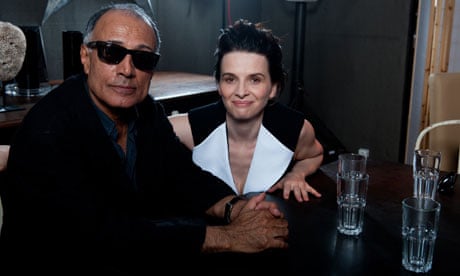A growing number of foreign artists, ranging from grassroots fringe performers to world-renowned stars, are ruling this country out of their future travel plans due to difficulties with obtaining visas. They are following in the footsteps of the admired Iranian film director Abbas Kiarostami, who abandoned plans to come to Britain to direct an opera after the UK embassy in Tehran asked him to submit his application documents twice.
Since its introduction in 2008, a revised system for short-term visitors has seen many artists, photographers and musicians threatened with deportation. Border officials routinely take fingerprints and ask for assurances that visitors do not plan to use their cameras, paintbrushes or instruments , in case they are coming for paid work.
The latest high-profile artist to rue his decision to travel to Britain is the Russian writer Alex Galper. A fortnight ago the acclaimed poet, who studied under Allen Ginsberg in New York, came to Britain on his American passport to give a poetry recital. But he was refused entry at Luton airport and is threatened with a 10-year ban.
"I said to them, 'I don't have to tell you what I am doing. I am an American citizen.' But they put me in the deportation room," said Galper this weekend from New York. His case has fuelled efforts by the anti-censorship pressure group English PEN – together with the London Mayor's office – to call on the government to scrap the approach currently adopted by the UK Border Agency.
Jonathan Heawood, director of English PEN, said: "The UK Border Agency seem to have lost their passport to common sense. They told us that their heavy-handed treatment of visiting artists was a thing of the past, but that message has clearly not filtered through to the airport officials who treated Alex Galper so appallingly. A visa for unpaid artists already exists and should have been offered to Alex. Instead, he was treated like a criminal and deported without his personal belongings, and the charity event he had hoped to attend was ruined."
English PEN argues that foreign artists do not take work from British and European residents since they are invited here for their specific abilities. The organisation would like to see the so-called Entertainer Visitor Route redefined as Artist Visitors to provide more clarity. At the moment, only artists who come into Britain to take part in a "permit-free" event, such as the annual Edinburgh International Festival, are allowed to accept a fee. PEN claims this creates unnecessary confusion.
"The current points-based visa system places a huge financial and bureaucratic responsibility on artists," added Heawood. "To invite just one artist to the UK as a 'licensed sponsor' costs over £500. This might be affordable to large institutions, but is far too expensive for small groups. The UKBA don't understand writers and artists, and they don't understand the value of art and literature to the UK economy and society."
Galper did not need to apply in advance for a normal tourist visa. Although Russian by birth, he has a job in New York, and writes and promotes his poetry part-time. He first flew to Britain a month ago to stay with a friend and then accepted an invitation to attend a poetry event in Germany, taking an overnight trip to Berlin. Galper also received an invitation from a London-based theatre company, the Gruntlers Arts Group, to appear for no fee at a fundraising gala night.
However, when Galper flew back to Luton from Germany, he was questioned by border officials who were suspicious that he could not show them an onward ticket for travel. Galper had, he said, made a booking for a return flight over the internet, but had no paper documentation. The Border Agency officials called Galper's friend in London, who mentioned that he was due at the charity poetry event that evening. As a result, it was ruled that Galper had been deliberately deceptive and had intended to work in Britain.
After making a phone call to the event organiser, David Parry, Galper was held in a cell overnight before being deported back to Germany the next day. "I knew all these people had been waiting for me in London," said Galper. "Appearing there and meeting people would have been the highlight of my life. Instead I had to leave all my clothes at my friend's house and travel without them for a month."
Back in London, the fundraising event was a flop and the journalists who came to interview Galper were sent home.
"I am still hopping mad with anger about it," said Parry. "I wanted to get some Beat poets together and there was a lot of interest. Then I got a call from Alex at the airport and he could not understand what was happening to him."
A Border Agency spokesperson said: "Creative artists from across the world are welcome to perform in the UK. However, as with any visitors, we expect individuals to meet entry requirements."

Comments (…)
Sign in or create your Guardian account to join the discussion